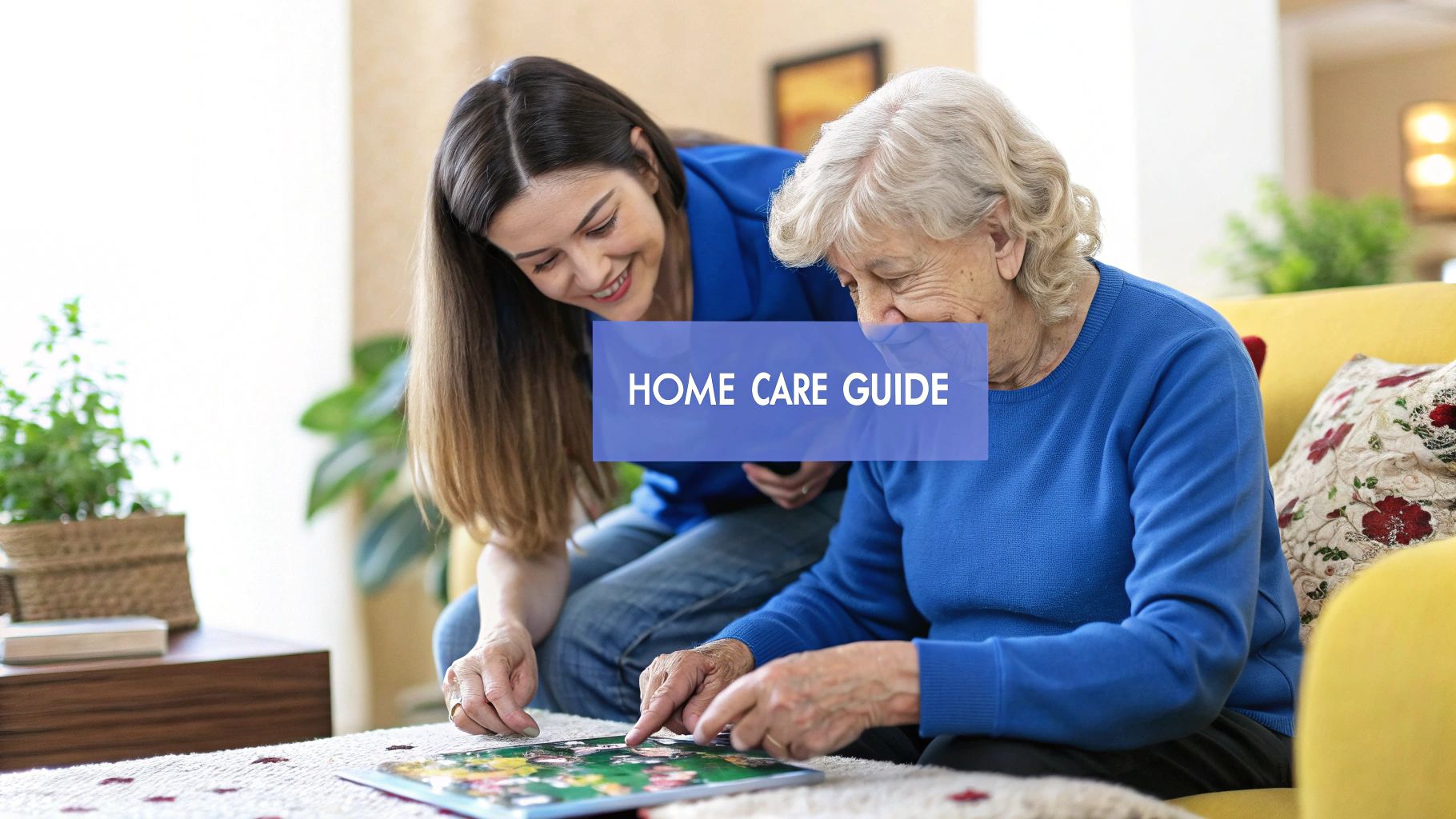When you hear the term home care assistance, what comes to mind? For many, it’s about having a compassionate, professional helper come directly to your loved one’s doorstep. It’s a personalized support service designed to help people, especially seniors, live safely and independently right where they want to be: in their own homes.
What Is Home Care and Why Is It So Important?
Picture a support system built entirely around your loved one's unique needs, daily routines, and personal preferences—all within the familiar comfort of their house. That's the heart of home care. It isn't about uprooting someone and moving them to a facility; it’s about making their home the best, safest, and most comfortable place it can be.
This idea, often called “aging in place,” has become the overwhelming preference for millions of families. Instead of facing the stress and disruption of a nursing home, home care provides a way to get help while surrounded by cherished memories and personal belongings. It’s a model that empowers independence, rather than taking it away.
The Growing Need for In-Home Support
The importance of home care is only getting bigger, thanks to a major demographic shift. By 2030, a stunning one in five Americans will be 65 or older. That number is expected to jump from 57.8 million in 2022 to nearly 89 million by 2060.
With about 75% of Americans over 50 saying they want to age in place, the demand for reliable home care assistance has never been higher.
This isn't just a trend; it's a fundamental change in how we think about long-term care. Families right here in Princeton and Mercer County are looking for solutions that respect their loved ones' desire for autonomy and comfort.
Home care is more than just a service; it is a partnership built on trust, respect, and compassion. It focuses on empowering individuals to live their fullest lives, regardless of age or physical limitations, by providing tailored support where they feel most secure—at home.
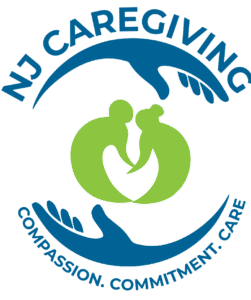
More Than Just a Helping Hand
Home care assistance is a broad term, covering everything from simple companionship to more hands-on personal care. It’s designed to address the practical, day-to-day challenges that can make living alone difficult.
Think of a caregiver as a trusted ally. They can help with tasks like:
- Daily Activities: Assisting with bathing, dressing, and grooming to help start the day with dignity.
- Meal Preparation: Making sure nutritious, tasty meals are on the table, which is crucial for good health.
- Light Housekeeping: Keeping the living space clean, safe, and comfortable.
- Companionship: Offering social interaction, conversation, and emotional support to ward off loneliness.
This kind of personalized support does more than just keep someone safe—it genuinely enriches their life. By taking care of these daily tasks, caregivers also lift a huge weight off of family members, freeing you up to spend more quality time together. Home care turns the challenges of aging into an opportunity for connection and well-being, making it an essential resource for families today.
The Different Types of Home Care Services
Deciding on home care assistance isn't a simple, one-size-fits-all choice. The reality is that "home care" is a broad term that covers a whole spectrum of support services, each designed for very different needs. It's less like buying an off-the-shelf product and more like creating a custom support system. You pick and choose the exact services that fit your family's situation, so you're only paying for what's truly needed.
Getting a handle on these different levels of care is the first crucial step. Let’s walk through the main categories, starting with non-medical support and moving toward more advanced medical care.
Comparing Home Care Service Tiers
To make sense of the options, it helps to see them side-by-side. This table breaks down the common tiers of home care, showing what they typically involve and who provides the support.
| Service Type | Common Tasks | Provided By | Primary Goal |
|---|---|---|---|
| Companion Care | Social activities, light housekeeping, meal prep, errands, friendship. | Companion Caregiver | To combat loneliness and provide social engagement. |
| Personal Care | Hands-on help with bathing, dressing, grooming, toileting, mobility. | Certified Home Health Aide (CHHA) or Personal Care Aide (PCA) | To assist with Activities of Daily Living (ADLs) and ensure safety and hygiene. |
| Skilled Nursing Care | Wound care, injections, IV therapy, medication management, vital sign monitoring. | Registered Nurse (RN) or Licensed Practical Nurse (LPN) | To provide medical treatment and manage complex health conditions at home. |
| Specialized Care | Condition-specific support (e.g., dementia, Parkinson's), memory care techniques, behavioral management. | Specially trained Caregiver or CHHA | To manage specific symptoms and improve the quality of life for those with chronic conditions. |
As you can see, each tier serves a distinct purpose, from providing a friendly face to delivering hospital-level medical care right in the living room.
Companion Care for Social Wellbeing
For many seniors living on their own, the biggest battle isn't physical—it's loneliness. Companion care is designed to tackle this head-on by focusing on social connection and emotional health. A companion is that friendly face who stops by for a chat, joins in a game of cards, or provides transportation for a trip to the local community center.
This kind of care is a perfect fit for seniors who are still fairly independent but could really use some regular company to stay sharp, engaged, and in good spirits.
- What it includes: Engaging in hobbies, reading aloud, accompanying to social events, and providing a stable, friendly presence.
- Who it's for: Seniors experiencing isolation, those who have recently lost a spouse, or individuals who can no longer drive but want to remain active in their community.
The image below really captures the essence of how personalized care, from simple companionship to more intensive support, forms the heart of what we do.
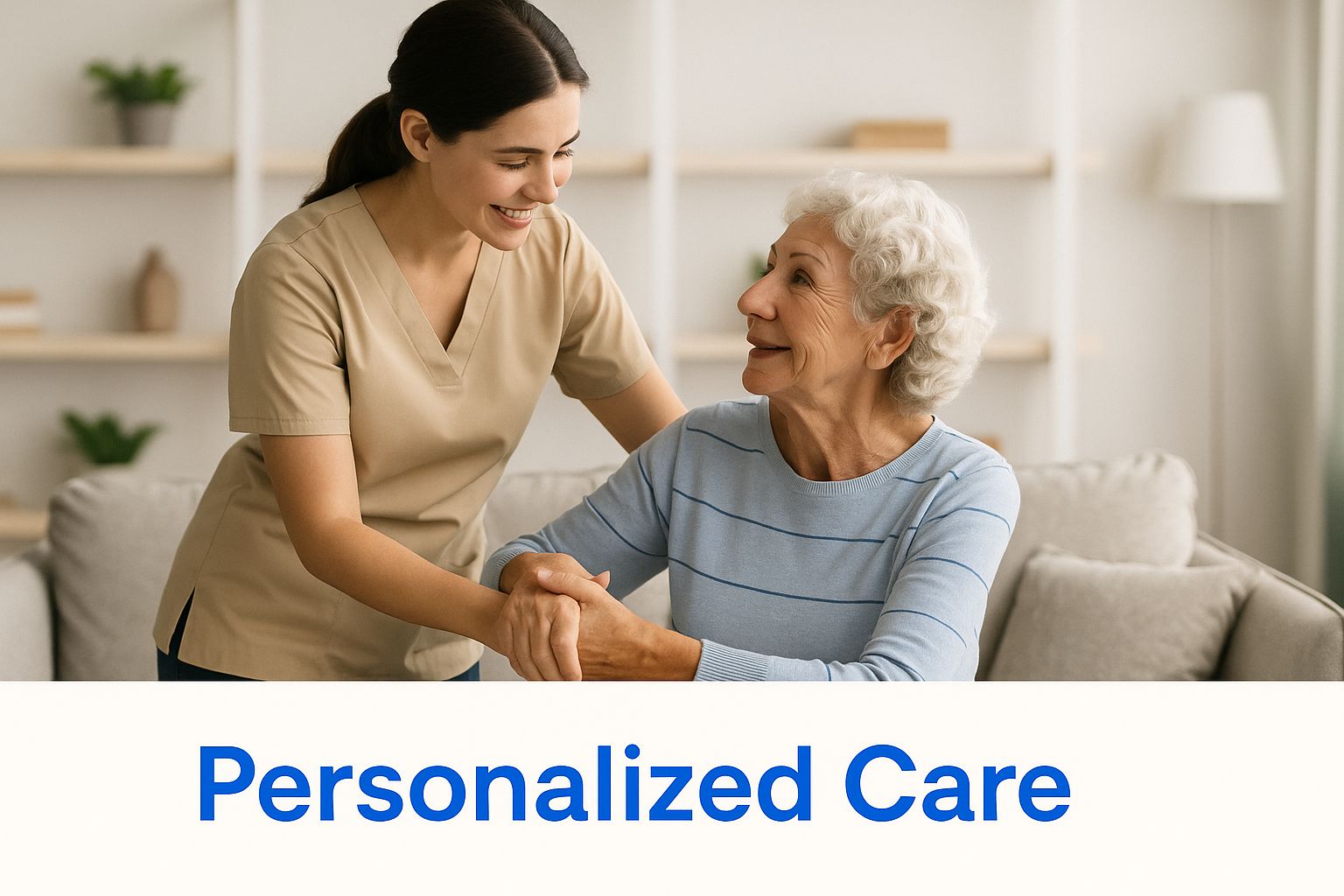
It’s a powerful reminder that truly effective home care is built on a foundation of compassionate, one-on-one relationships.
Personal Care for Daily Living Activities
When everyday tasks like bathing or dressing become a struggle, personal care steps in to offer hands-on help. This is the next level of support, focusing on what experts call Activities of Daily Living (ADLs). The goal here is simple: to help your loved one maintain their dignity and hygiene while moving through their day safely.
Caregivers providing personal care are trained to be sensitive and respectful while assisting with these very private routines.
Personal care is about enabling independence, not taking it away. By assisting with difficult tasks, caregivers empower seniors to continue living in their own homes with confidence and security.
Think about a senior recovering from a fall. Just getting in and out of the shower can feel like a high-wire act. A personal caregiver provides that steady hand needed to prevent another accident, turning a risky situation into a safe and comfortable part of the day.
Skilled Nursing Care for Medical Needs
Sometimes, the needs at home are purely medical and demand a licensed professional. Skilled nursing care is just that—care provided by a Registered Nurse (RN) or Licensed Practical Nurse (LPN) under a doctor's orders. It’s the same level of care you'd get in a hospital, but delivered in the familiar comfort of home.
This service is absolutely essential for managing complicated health issues or for helping someone recover safely after surgery.
Examples of skilled nursing services include:
- Wound care and dressing changes
- Administering injections or IV therapy
- Monitoring vital signs and managing medications
- Providing education to the patient and family about their condition
This type of home care assistance effectively bridges the gap between a hospital stay and home, ensuring a recovery that is both smooth and safe.
Specialized Care for Specific Conditions
Finally, many people are living with specific health conditions that require a unique approach. Specialized care is tailored for challenges like Alzheimer's, Parkinson's, or post-stroke recovery. Caregivers in this field get extra training to truly understand the nuances of these conditions.
For instance, a caregiver specializing in dementia knows how to navigate behavioral changes, create a safe and calming environment, and use memory care techniques to support cognitive function. This targeted expertise makes a world of difference, dramatically improving quality of life for the client and bringing immense peace of mind to the family.
Navigating the Costs of In-Home Care
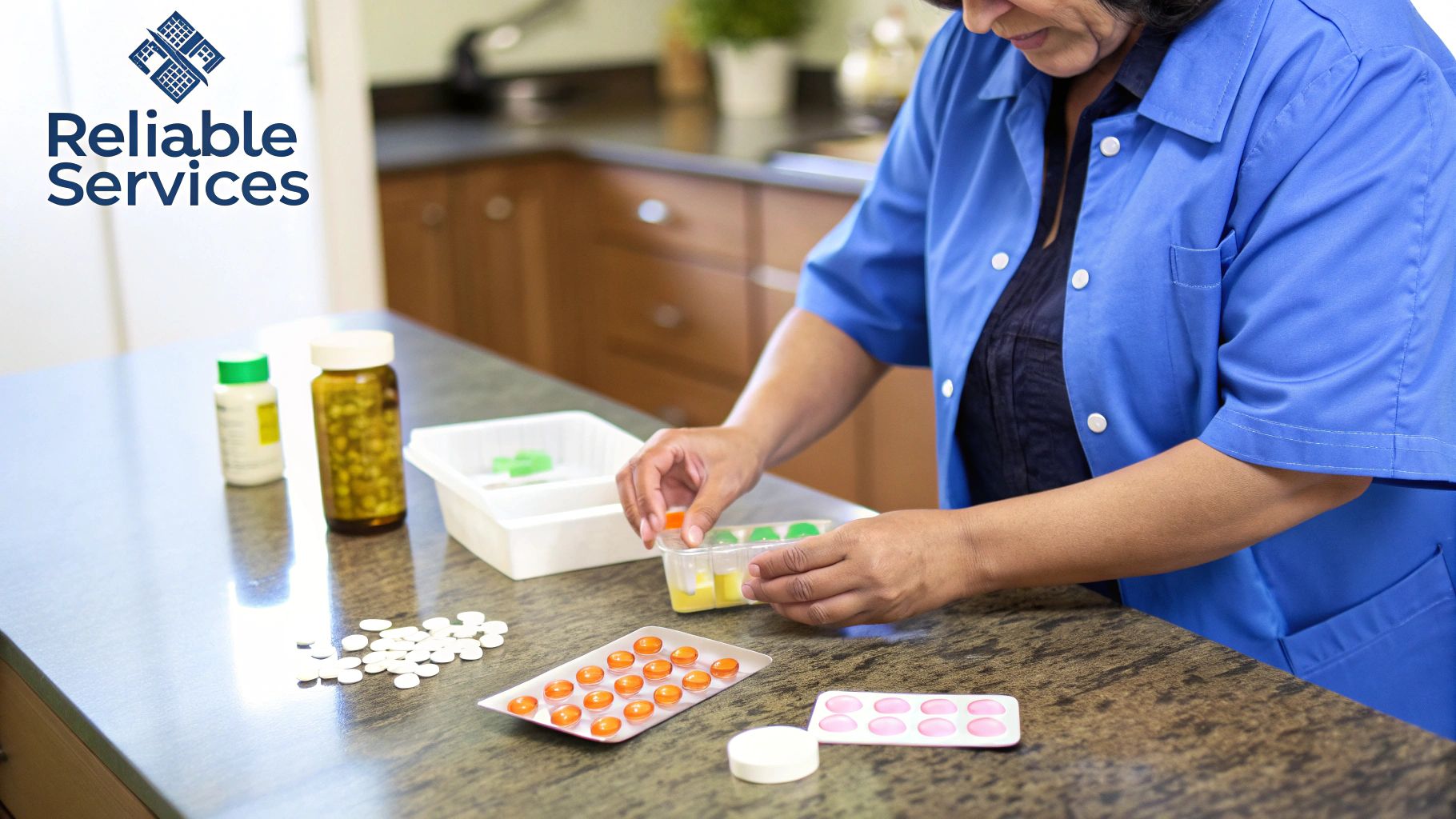
One of the first—and biggest—questions families have when they start exploring home care is about the cost. It’s completely understandable. You want to make sure your loved one gets the best support possible, but you also need a plan that’s financially sustainable for the long haul.
The truth is, there’s no single price tag for home care. Think of it less like a fixed number and more like a custom plan built around your family’s unique situation. The final cost really depends on the specific pieces you put together.
What Determines the Price of Home Care
A few key things directly shape the cost of care services. The most significant factor is the level of care your loved one needs. Simple companion care will naturally be different from specialized dementia care or skilled nursing services provided by a registered nurse.
The number of hours needed each week is another major piece of the puzzle. A family looking for a few hours of help on weekends will have a very different budget than someone who needs round-the-clock supervision to stay safe at home.
Finally, where you live matters. Costs for home care in areas like Mercer County will reflect the local economy and cost of living, so they'll differ from other parts of the country.
The key takeaway is that home care costs are not arbitrary. They are a direct reflection of the expertise, time, and personalized attention your loved one receives, ensuring they get the precise level of support they need to thrive at home.
Common Payment Models Explained
Home care agencies usually structure their pricing in a few straightforward ways. This flexibility helps families find a model that fits their budget and care schedule.
- Hourly Rates: This is the most popular option. You pay an agreed-upon rate for each hour of service, which offers incredible flexibility. It's perfect for families who need part-time support or expect their needs to change over time. You might start with 10 hours a week and adjust from there.
- Live-In Care: For someone who needs 24-hour supervision, live-in care can be a more affordable solution than paying hourly around the clock. With this model, a caregiver lives in the home and is provided with room, board, and designated sleep breaks, ensuring someone is always there.
- Overnight Care: This is for individuals who are mostly independent during the day but need supervision at night because of risks like falling or wandering. It provides peace of mind when it's needed most.
Getting familiar with these models is the first step in forecasting expenses and making a plan you feel confident about.
Exploring Your Payment Options
Once you have a general idea of the cost, the next question is how to pay for it. The good news is that many families use a combination of resources, not just their personal savings.
1. Long-Term Care Insurance
These policies are specifically designed to cover services just like in-home care. It’s important to pull out your policy and review the details to understand coverage limits and what you need to do to qualify.
2. Private Pay
Using personal savings, pensions, or other private funds is the most direct way to pay for care. It gives you the most control and flexibility in choosing your provider and the exact services you want.
3. Government Programs
While they often have specific criteria, some government programs can help offset the cost:
- Medicare: This usually covers short-term, medically necessary home health care after a hospital stay. It generally does not pay for long-term personal or companion care.
- Medicaid: As a program for low-income individuals, Medicaid may cover non-medical home care services. Eligibility and what's covered can vary quite a bit from state to state.
- Veterans Affairs (VA) Benefits: Eligible veterans might have access to programs like Aid and Attendance, which can provide funds to help pay for home care.
The U.S. home care industry has become a huge part of our healthcare system, valued at about $107.07 billion. This market is expected to grow by over 64% in the next seven years. This trend is backed by policy changes, like a recent Medicare proposal aimed at expanding home care coverage for millions more seniors. It all points to a clear preference for flexible, patient-centered care at home. For a deeper dive, you can explore the full US home care industry statistics.
The Real Benefits of Home Care Assistance
Choosing home care assistance often starts from a simple, practical need. But its real value goes so much deeper than just having an extra set of hands around the house. The benefits ripple outward, touching everything from physical health and emotional wellness to the entire family dynamic. It’s the difference between just getting by at home and truly thriving there.
One of the biggest game-changers is the personalized, one-on-one attention. In a facility, a caregiver's time is split between many residents. At home, their focus is entirely on your loved one. This allows for a genuine bond to form—one built on trust, understanding, and real companionship.
Preserving Independence and Dignity
For most of us, the thought of losing our independence is genuinely scary. Home care is specifically designed to protect it. By stepping in to help with the tasks that have become difficult—whether that’s getting dressed, cooking a meal, or keeping track of medications—caregivers empower people to stay in control of their own lives.
This isn't about taking over; it's about enabling. It might look like a steady arm to hold while walking to a favorite spot in the garden, or help with chopping vegetables so they can still enjoy the familiar taste of a home-cooked meal. These small acts of support are what preserve that crucial sense of self.
Home care’s greatest strength lies in its ability to adapt to the individual. It honors a person's history, respects their preferences, and supports their desire to live on their own terms, surrounded by the comfort of familiarity.
Enhancing Physical and Mental Health
From a pure health perspective, staying home has clear advantages. People receiving care in their own environment have a much lower risk of being exposed to the kinds of infections that can spread quickly in group living facilities. A familiar, controlled space is simply a safer place to be.
The mental and emotional boosts are just as powerful. The consistent, friendly interaction from a caregiver can dramatically cut down on the loneliness and isolation that often lead to depression and cognitive decline. It’s a source of regular companionship, stimulation, and a vital connection to the world.
- Consistent Routine: A stable daily schedule helps reduce anxiety, especially for anyone dealing with memory issues.
- Nutritional Support: Caregivers make sure meals aren't just easy, but also nutritious and tailored to specific dietary needs.
- Medication Reminders: Getting medications right is non-negotiable for good health, and a caregiver provides the consistency needed to stay on track.
This approach is gaining traction worldwide. The home care market was valued at about $157.15 billion in 2021 and is expected to grow to around $187.6 billion soon, thanks to aging populations and new health technologies. You can dig into these global home care industry statistics to see the bigger picture.
Providing Relief for Family Caregivers
The positive effects of professional home care reach the whole family. Stepping into the role of a family caregiver is an incredibly demanding job that often leads to stress, exhaustion, and burnout. Bringing in a professional provides immediate, essential relief.
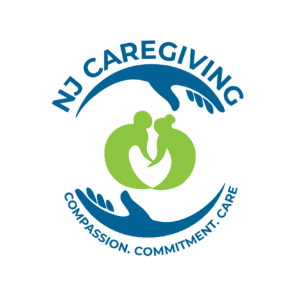
This support gives you permission to step back from being a full-time caregiver and just be a son, daughter, or spouse again. It frees you up—physically and emotionally—so you can focus on enjoying quality time with your loved one, not just managing their daily tasks. This kind of respite isn’t a luxury; it’s a necessity for keeping family relationships healthy and ensuring everyone’s well-being for the long haul.
How to Find the Right Home Care Provider

Choosing a home care provider is one of the most personal decisions your family will ever make. You’re not just hiring a service; you’re inviting someone into your home and trusting them with the well-being of a person you love.
The process can feel overwhelming, but breaking it down into clear, manageable steps makes all the difference. Think of this as your practical roadmap. It’s about knowing where to look, what questions to ask, and how to evaluate that human connection that defines truly great care.
Starting Your Search for Home Care Assistance
The first step in finding the right home care assistance provider is simply gathering good information. Think of it as building a solid foundation. You want to cast a wide net at first, collecting names and recommendations from sources you trust before you start narrowing things down.
Often, the best place to start is the most traditional one: word-of-mouth. Ask friends, neighbors, or colleagues if they have any personal experience with agencies in the Princeton or Mercer County area. A recommendation from someone who has already walked this path is invaluable.
You should also tap into these trusted resources:
- Healthcare Professionals: Your loved one’s doctor, a hospital discharge planner, or a geriatric care manager often have a list of reputable local agencies they work with.
- Online Directories: Websites like the National Association for Home Care & Hospice (NAHC) or your local Area Agency on Aging can help you find certified providers nearby.
- Community Centers: Local senior centers and faith-based organizations are great resources for vetted care providers who serve the community.
Try to gather a list of three to five promising agencies. This gives you enough options to compare without feeling completely overwhelmed.
Key Questions to Ask Every Agency
Once you have your shortlist, it’s time to pick up the phone and start your interviews. This is the vetting process. Your goal is to get a real feel for how each agency operates, what they stand for, and if their approach lines up with your family’s needs and values. Don’t hold back—a professional agency will welcome your detailed questions.
A transparent and forthcoming home care agency is a great sign. They should be eager to answer your questions and provide whatever documentation you need to feel secure in your decision.
Prepare a checklist of questions you can ask each provider. This helps you make a fair, side-by-side comparison and keeps you focused on what really matters.
Essential Vetting Checklist:
- Credentials and Licensing: Is the agency licensed, bonded, and insured in the state of New Jersey? This is non-negotiable, as it protects you from liability and ensures they meet state standards.
- Caregiver Screening: What does your background check process look like? Ask if they check criminal records, personal references, and driving records for every single caregiver.
- Training and Supervision: What kind of initial and ongoing training do caregivers receive? Who supervises them in the field, and how often are check-ins conducted?
- Care Planning: How do you develop a personalized care plan? How often is it reviewed and updated with our family's input?
- Contingency Plans: What happens if our regular caregiver is sick or can't make it? How do you ensure we're never left without care?
These questions cut right to the chase, giving you a clear picture of an agency’s professionalism, safety protocols, and commitment to quality. You can learn a lot from their answers. For a closer look at our own commitment, you can see a visual breakdown in our company's infographic.
Assessing the Human Element
Beyond the licenses and background checks lies the most important factor of all: the human connection. The relationship between your loved one and their caregiver is truly the heart of successful home care. A good agency gets this and will have a thoughtful process for matching clients with the right people.
When you're talking to them, ask specifically about their matching process. How do they account for personality, shared interests, and communication styles? A great match is about more than just skills and availability; it’s about finding someone who will genuinely connect with your loved one.
Any reputable agency will encourage a “meet and greet” before services officially begin. This gives you, your loved one, and the proposed caregiver a chance to see if the chemistry feels right. Always trust your gut during this meeting. If it doesn’t feel like a good fit, a quality agency will have no problem finding another option. That focus on compatibility is often what separates a good provider from a great one.
Common Questions About Home Care Assistance
Taking the first steps toward home care assistance naturally brings up a lot of questions. It's a big decision for any family, and you deserve clear, direct answers before you move forward. We get it.
This section is designed to tackle the most common uncertainties we hear from families right here in Princeton and Mercer County. Think of it as a straightforward conversation to give you the confidence you need.
What Is the Difference Between Home Care and Home Health Care?
This is easily one of the most common points of confusion, but the distinction is actually quite simple. The easiest way to think about it is separating “living support” from “medical treatment.”
Home care is non-medical help focused on the activities of daily living. It’s all about helping someone maintain a safe, comfortable, and dignified life at home. This includes things like:
- Personal care (bathing, dressing, grooming)
- Companionship and conversation
- Preparing meals and light housekeeping
- Rides to appointments and errands
Home health care, on the other hand, is skilled medical care that has to be prescribed by a doctor. It’s delivered by licensed healthcare professionals—like nurses or physical therapists—to treat a specific medical issue. This might involve wound care after a hospital stay, physical therapy to rebuild strength, or managing injections.
In short, home care supports a person's lifestyle, while home health provides clinical treatment.
How Do I Know When It’s Time for Home Care?
There’s rarely a single “aha!” moment. It’s usually a slow build-up of small but noticeable changes that suggest a little extra support could make a big difference. Recognizing these signs early allows you to be proactive, rather than reacting to a crisis.
Some of the most common indicators include:
- Recent Falls or Mobility Issues: A few stumbles or a new fear of falling is a major red flag for safety at home.
- Trouble with Daily Tasks: You might notice the house isn't as tidy as it used to be, or your loved one is having a hard time with personal hygiene or cooking.
- Increasing Forgetfulness: Forgetting to take medication, pay bills, or turn off the stove can pose a serious risk.
- Growing Social Isolation: When someone pulls back from hobbies, friends, and community events, it’s often a sign they need more companionship.
Another huge factor is family caregiver burnout. If you or other family members feel completely stretched thin and exhausted, that’s a clear signal it’s time to bring in professional support. Often, just starting with a few hours a week can provide immediate relief for everyone.
Can We Meet and Approve the Caregiver Before They Start?
Absolutely. In fact, you should insist on it. Any reputable home care agency knows that the connection between a client and a caregiver is deeply personal. Finding the right personality match is just as critical as finding someone with the right skills.
The process should always feel collaborative. A good agency will start with a thorough assessment to understand your loved one’s needs, daily routines, and personality. From there, they’ll recommend a caregiver they believe is a great fit.
You always have the final say. The chance to meet, interview, and approve a caregiver before services begin is a non-negotiable standard for high-quality agencies. It ensures everyone feels comfortable and trusts the process from day one.
And if, for whatever reason, the chemistry isn't quite right after that first meeting, the agency should be more than happy to introduce another qualified professional. Your peace of mind is what matters most.
What Happens If Our Regular Caregiver Is Unavailable?
This is one of the biggest advantages of working with a professional agency versus hiring someone privately. Life happens—caregivers get sick, have family emergencies, or take well-deserved vacations. A professional agency has an entire team of vetted, trained, and qualified caregivers ready to step in.
If your primary caregiver can't make their shift, the agency is responsible for arranging a suitable, trained substitute so there are no gaps in care. You're never left scrambling at the last minute to find a replacement.
This seamless coverage is a cornerstone of professional home care, giving you and your family incredible reliability and security. It ensures your loved one always has the support they depend on, no matter what.
Are you ready to explore how professional home care assistance can support your family in Princeton or Mercer County? The dedicated team at NJ Caregiving is here to answer all your questions and create a personalized care plan that fits your needs. Contact us today for a complimentary consultation at https://njcaregiving.com.

